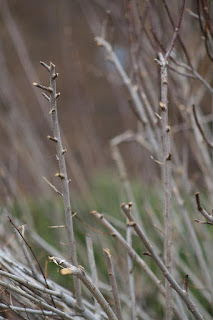In the last year I've made exponential leaps in understanding the writing life. Well, not exponential--more like concrete affirmations, as in, bang your head against concrete affirmations. Writing is like whipping yourself, it's masochistic, it's like jumping into quicksand. Why do I do this to myself? What, exactly, is the point? The payoff? Why must I be so meticulous? Why is writerly process more like my being processed by a meat grinder?
Last Sunday I left for Wichita, KS to research my family's immigration to Kansas in 1874-1879, planning to use the Mennonite Library and Archive in Newton and visit some ancestral churches (Hoffnungsau, Alexanderwohl, Bergthal).
Halfway there, in Concordia, my back left tire blew at 70mph. Luckily, it happened right in front of the volunteer fire chief's house, and he exhuberantly put on my spare for me. Something punctured the tire. It was terrifying, and I drove on edge the rest of the week.
The only tire place that is open is a mini Walmart-esque place for farmers--they don't have the right tire size. I concede and head to the Holiday Inn to get a room, knowing I lose a day of research. The nice receptionist hooks me up with an after hours tire service. Said service guy tells me upon inspecting my lug and bolts that the fire chief did not thread the bolts correctly into the hub--actually stripped the threads--and he worked hard to get 4 of the 5 to screw in, suggesting I shouldn't even drive on 4, and that it'd take a day or two to get a 5th.
I drove to Wichita anyway. 4 hour trip is now 8. Stopped twice to make sure the bolts were tight. Monday morning I spent 2 hours at the car dealership getting 5 new lug bolts, and finding out I was lucky that the lug threads were fine, cuz that would've been $1,000 for a new lug. So far, I'm only up to $450 in tire expenses.
Wednesday morning my engine light comes on. Back to the Wichita dealership after just driving to Newton (35 minutes one way). An air hose, that helps mix the fuel or something, has cracked and could've lead to the engine, well, seizing. Soon. Luckily this fix was free, but I'd wasted an entire afternoon messing with my car, again.
As for the research itself I made NO HEADWAY at all. Dead end after dead end after dead end. All the sources I wanted to see were not helpful. Even my great great great grandmother was not buried in the cemetary she was reported to be buried in, and I was not going to spend a week searching county records and cemetaries, nor was I going to hire a forensics team to dig up the church plots. My family is lost, in great measure, so when I see someone burning down an old church or razing an old barn or farmhouse, I get mightily pissed. In America, we sure do love to erase ourselves. I think some call it progress. I call it cultural alzheimers.
I ended my trip early, retreated home.
Back in 2006 in Wichita, at a toll booth, an RV sideswiped my car cuz the driver couldn't decide which toll lane he wanted (he'd never driven an RV before, and had no insurance). Much of my car was bent, ripped off, concave. This happened a few days after my grandmother's funeral in Oklahoma, on my way back to Nebraska. I don't care for Wichita.
Point is--$^%*&@^!!. I think the best a person can do with this sort of book project is just cull together what one can from more famous people who shared the boat ride over, shared the homesteading experience, and pretend it's your family--a bunch of relative nobodies who had little money and rented farms until 1884-ish, yet transformed the plains into a completely new landscape in 10 years. Maybe I can compare my road trip to fixing a schooner wheel as a tornado or prairie fire or bison heard approaches.
It's time to move on, and maybe come back to family months later. It's time to research Mennonite missionaries in Oklahoma, the Cheyenne and Arapaho tribes, government policy towards them in Oklahoma territory, and the changing ecology of the most diverse state in the union. At least I'll make some headway. Right?
.jpg)











































